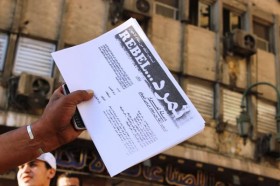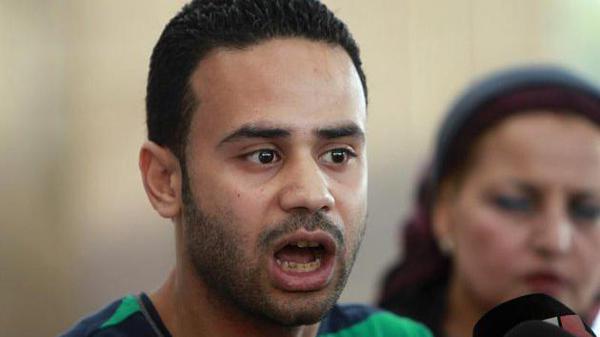 An Egyptian political lobbying movement has called for live broadcast of the upcoming trial of ousted President Mohamed Morsi, saying that it would guarantee the trial’s fairness and transparency.
An Egyptian political lobbying movement has called for live broadcast of the upcoming trial of ousted President Mohamed Morsi, saying that it would guarantee the trial’s fairness and transparency.
“We want Morsi’s trial to be both fair and transparent,” Mahmoud Abdel-Aziz, one of the founders of Tamarod (Rebellion) movement, told the Anadolu Agency.
“This would necessitate the trial to be broadcast live.”
The Cairo Appeals Court has set November 4 for the start of the trial of Morsi — Egypt’s first democratically-elected president — and 14 of his allies on charges of inciting the murder of peaceful protesters outside the Ittihadiya presidential palace, east of Cairo, last year.
The Interior Ministry has not officially settled on the location of the trial. However, some security sources told the AA earlier that the trial is expected to be held at the police academy near Tora prison, south of Cairo.
The sources said two halls were prepared for the upcoming trial and that judges had already checked the site and recommended more security measures to protect the judges as well as the cage where Morsi and the other 14 defendants will stand during the trial.
Tamarod is the Egyptian youth movement that claims to have collected more than 20 million petitions for Morsi to step down, before the powerful Egyptian military ousted him on July 3.
Local media has earlier reported that security agencies do not want Morsi’s trial to be televised, lest the trial would provoke the backers of the ousted president into attacking the court.
In July, tens of protesters were killed outside the Republican Guard Club, east of Cairo, following reports that Morsi was detained by the army there.
Morsi has been held at an unknown location since the army ousted him on July 3 with the backing of the secular political forces and the nation’s top Islamic and Christian religious establishments.
The official spokesperson of Tamarod, Mai Wahba, underlined the importance of holding a fair trial for the deposed president.
She asserted, however, the fact that Morsi is Egypt’s first freely-elected president should not give him immunity from trial.
In 2011, the then ruling military council allowed state TV to broadcast the trial of former President Hosni Mubarak, his two sons, his interior minister and six Interior Ministry officials. This was unprecedented in the history of the country.
Morsi’s backers consider Morsi’s ouster by the army as a “military coup” against an elected leader, while pro-military groups said the move was taken upon “the popular will” demonstrated in mass protests against his rule.

